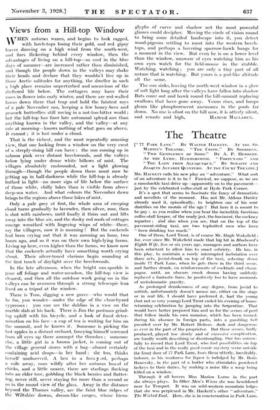Views - from a Hi li-top Window
WHEN autumn wanes, and begins to look ragged, with larch-tops losing their gold, and red gipsy leaves dancing on a high wind from the south-west, and fires flickering behind every window, then the advantages of living on a hill-top—so cool in the blue days of summer—are increased rather than diminished, and though the people down in the valleys may shake their heads and declare that they wouldn't live up in those Arctic solitudes for anything, the dweller in such a high place remains unperturbed and unenvious of the sheltered life below. The cottagers may have their roses in flower into early winter, and there are red-walled fawns down there that trap and hold the faintest rays. of a pale November sun, keeping a few honey-bees and peacock butterflies still roving in a not-too-bitter world ; but the hill-top has finer late autumnal splend _airs than anything known in the valley, and the valley—at any rate at morning—knows nothing of what goes on above. It cannot ; it is lost under a cloud.
That is the richest, and the most repeatedly amazing view, that one looking from a window on the very crest of a steeply-rising hill can have : the sun coming up in salmon pink over distant beechwoods, and the valleys below lying under dense white billows of mist. The villages absolutely enshrouded, not a light glowing through—though the people down there must now be 'getting up in half-darkness while the hill-top is already bathed in light—no more sign of life below the surface of those white, chilly lakes than is visible from above deep-sea water. And what colours the November dawn brings to the regions above those lakes of mist.
Only a pale grey at first, the whole area of creeping cloud turns gradually to lavender, then silver, rose, then is shot with rainbows, until finally it thins out and lifts away into the blue air, and the dusky red roofs of cottages emerge wreathed with lingering wisps of white—there, say the villagers, now it is morning ! But the cockerelS had been crying out that it was morning an hour, two hours ago, and so it was on their own high-lying farms. Living up here, even higher than the farms, we know now that the cockerels actually have something worth crying about. Their silver-toned clarions begin sounding at the first touch Of daylight over the beechwoods.
In the late afternoon, when the bright sun-sparkle is gone off foliage and water-meadow, the hill-top view is clearest, and then all the outdoor work going on in the valleys can be overseen through a strong telescopic lens fixed on a tripod at the window.
There is Tom, digging a new grave—who would that be for, you wonder—under the edge of the churchyard cypresses : yOu can see the dahlias in a vase on the marble slab at his back. There is Jim the postman grind- ing uphill with his bicycle, and a look of fixed deter- mination on his face—a cup of tea is waiting for him on the summit, and he knows it. Someone is picking the last apples in a distant orchard, fancying himself screened from all eyes up there amongst the thrushes ; someone else, a little girl in a brown jacket, is coming out of the village general stores with a bag—almost certainly containing acid drops—in her hand : she too, thinks herself unobserved. A hen in a farnr.yird, perhaps it mile -away, runs wildly after her autumn broad of chicks, and a little nearer, there are starlings flocking into an elder tree,. gobbling the black berries and flutter- ing, never still, never staving for more than a second or so in the round VieW of the glaSS. Away in the distance beyond the Thames valley, are the faint blue ridges of the Wiltshire dOwns, dreamlike ranges, whose hiero- glyphs of . glyphs of curve and shadow not the most pOWerful glasses could decipher: Moving the circle of vision round to bring some detailed landscape into it, you detect wood-pigeons settling to roost into the western beech- tops, and perhaps a hovering sparrow-hawk hangs for a moment in the view. But even lie is on a lower level than the window, unaware of eyes watching him as his own eyes watch for the field-mouse in the stubble. Watching, watching ; you are only a tiny part of all nature that is watching. But yours is a god-like altitude all the same.
The sun sinks, leaving the north-west window in a glow of soft light long after the valleys have fallen into shadow Bats come out and hawk round the hill-summit replacing swallows that have gone away. Venus rises, and lamps gleam like phosphorescent anemones in the pools far down. No one is afoot on the hill now, it is utterly silent,


















































































































 Previous page
Previous page